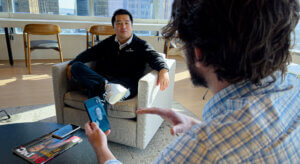As the largest Deaf-owned company in the world, we’re made up of diverse Deaf employees from all walks of life. However, we share a common understanding of what audism is. Audism is discrimination against Deaf people due to their hearing status. There are plenty of examples of audism, but one example that many Deaf people know too well is that getting together with hearing and non-signing family members and friends for dinner may be difficult for Deaf people.
This example is called the Dinner Table Syndrome.
What’s Dinner Table Syndrome?
It’s when Deaf people experience isolation and disconnect from their hearing and non-signing relatives and friends because they cannot communicate with each other. So, Deaf people feel neglected and invisible during what should be a festive family gathering for special occasions, such as holidays.
Why is it important to talk about Dinner Table Syndrome?
We’re all about inclusion and making everyone feel welcome. This topic needs more awareness so that people can have conversations on how communication barriers occur in family gatherings and how we can address them. There may be a time in your life when you felt excluded or ignored in social gatherings, but you were able to find other ways to connect with friends and family in different settings. For Deaf people, they may not have a lot of opportunities to connect with their family, even during the most festive holidays.

How do Deaf people cope with Dinner Table Syndrome?
Although every Deaf person’s experience with Dinner Table Syndrome varies, there are common answers on what Deaf people do to deal with Dinner Table Syndrome.
- Some Deaf people grab a plate of food and find a seat to watch the TV; they may eat and watch TV for the entirety of their visit.
- Other Deaf people may grab a plate to eat and then leave after eating. Since they don’t feel welcome or connected, they may feel they’d be wasting their time staying somewhere they don’t have communication access with their family.
- On some occasions, Deaf people bring their Deaf friends and/or signing friends to spend time with them while at family gatherings to counter communication inaccessibility.
- There may be some Deaf people who don’t have a lot of options to deal with the inaccessibility, so they may eat and stay quiet.
In one of Convo’s community events, THE HANGOUT, where Deaf people get together virtually to discuss their thoughts, opinions, and perspectives on certain topics, Dinner Table Syndrome was featured with four participants. They shared their experiences growing up and how it impacted them. It’s worth a watch and read. You can watch the video or read the full transcript here.

What can you do to make everyone feel included?
If you and your family have a Deaf family member or are expecting to host a Deaf person over for the holidays, consider hiring an interpreter to be around to create conversations for everyone. You can encourage Deaf people to bring their Deaf friends along for the holidays so that they can enjoy spending time with the family gathering even if you all don’t communicate; this will help the Deaf person to feel as if they’re part of the holiday festivities. Give your Deaf family members full autonomy in what feels right for them; they may come up with alternatives that can make you feel included with them.
Also, make sure that you don’t say these to Deaf people during these gatherings:
- “I’ll tell you later.”
- “Never mind.”
- “It’s not worth it.”
- Or any paraphrasing or summaries of what was being said
We believe that all occasions, especially the holidays, are for everyone. Let’s address Dinner Table Syndrome head-on and start making everyone feel included and welcome.





